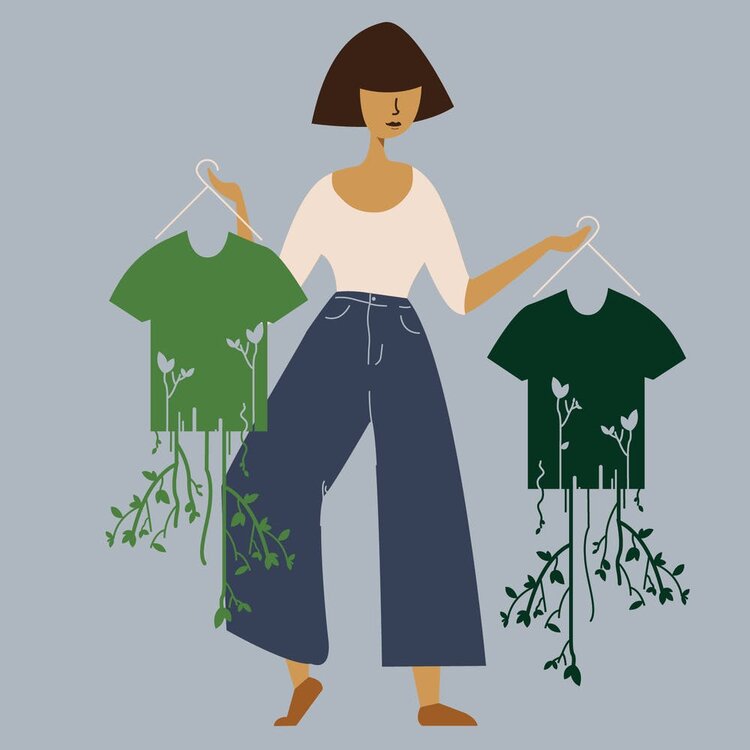Why we should switch to an ethical lifestyle
Did you know most clothing in your wardrobe is unethically made? In fact, one pair of jeans requires almost 7,000 liters of water to make. According to World Wildlife, in the US alone, the production of wasted food generates the equivalent of 37 million cars’ worth of greenhouse gas emissions. A lack of sustainability is overwhelmingly present in a typical lifestyle: food waste and fast fashion are just some parts that harm our planet and its inhabitants.
Luckily, by adapting an ethical lifestyle, we can change our impact.
An ethical lifestyle has a different meaning for each person but in general it’s a lifestyle where you feel your best and help your community while doing so. A way of living should not come at the cost of nature, animals, and humans around the world. Life should not bring other lives down.
Vanessa Wasi, from Wasi Clothing is a firm believer in an ethical lifestyle. Why should people switch to an ethical lifestyle? Wasi says: “Shopping ethical means you care about garment workers, BIPOC workers and even female workers and that they deserve ethical pay, fair wage and good working conditions.” Wasi is especially concerned about the well being of BIPOC workers (Black, Indigenous and People of Color): “BIPOC garment workers are forgotten so often, it fills me with so much sadness and a sort of uncontrollable drive to change this toxic industry [fashion industry].” Put simply, adopt an ethical lifestyle to improve the lives of many universally.
Jazmin Devonish from Eco-lit candles also urges people to switch to an ethical lifestyle to “be mindful towards the needs of others and create a positive ripple effect.” Devonish believes that your actions can have a genuine positive effect, so it’s important to start taking the right steps.
Implementing an ethical lifestyle is simpler than you might think. There is no need to clean out your closet and pantry immediately; the best way you can make a lifestyle transition is by making gradual change.
Devonish is a big supporter of small changes, encouraging people to take on new initiatives such as “going to a local farmers market, growing your own fruits, and taking use of what you already have.” Being able to source your goods is a great way to transition into an ethical lifestyle.
A common concern is that an ethical lifestyle will come at the cost of your wallet. Supporting fair labor, and natural materials can often mean prices of everyday items soar for the ethical buyer.
An ethical garment typically costs more upfront than a garment of fast fashion. This can be due to higher fabric costs or higher labor costs paid by the company. However, ethical garments tend to last longer since they are made with quality fabrics, while garments of fast fashion tend to be made with cheaper materials. By continuously purchasing fast fashion, you will have to replenish your wardrobe more often, thus spending more money on clothing.
Investing in ethical garments isn’t the only way to live an ethical lifestyle. Many have been thrifting or “upcycling” garments instead. Making a trip to your local thrift store instead of the mall is an easy, affordable way to make your closet ethical. By wearing used clothes, you are extending the life cycle of a garment and saving it from waste piles.
One of the commonly forgotten aspects of an ethical lifestyle is supporting diversity. Diversity is essential for an ethical future, and thus important for an ethical lifestyle. Without the input of various peoples, the future cannot be sustainable for all. Shaleeta Jones from Eco-lit candles points out that many brands’ “diversity” is not enough: “We can be included in a room, but that doesn’t mean we can decide our future with final decisions.” An ethical company must take into account the viewpoints of a variety of people to help all groups of people live ethically. You can incorporate diversity into your ethical lifestyle by supporting brands that practice cultural appreciation and size inclusivity.
Transitioning to an ethical lifestyle can seem overwhelming, but in the end, it’s worth it. You can live a more peaceful and rewarding life, as well as help countless people around the world.



